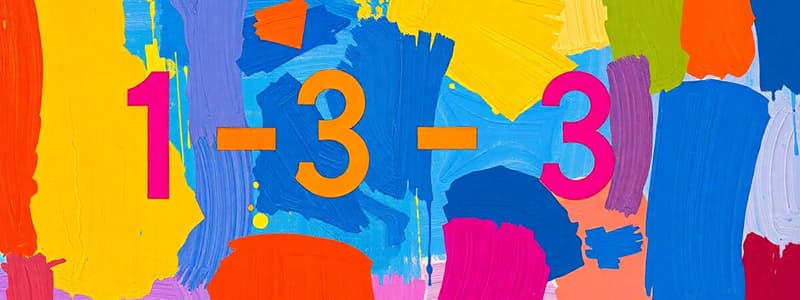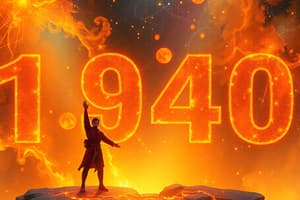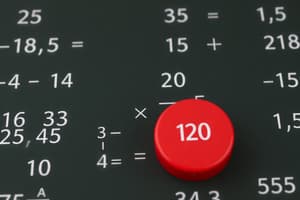Podcast
Questions and Answers
What does the decimal place to the right of the decimal point represent?
What does the decimal place to the right of the decimal point represent?
- Tenths (correct)
- Whole numbers
- Thousands
- Hundreds
The decimal number 0.75 is equivalent to the fraction 3/4.
The decimal number 0.75 is equivalent to the fraction 3/4.
True (A)
What is the expanded form of the decimal number 47.82?
What is the expanded form of the decimal number 47.82?
40 + 7 + 8/10 + 2/100
The bottom number of a fraction tells how many equal parts a whole amount is divided into, also known as the ______.
The bottom number of a fraction tells how many equal parts a whole amount is divided into, also known as the ______.
Match the decimals to their corresponding fractions:
Match the decimals to their corresponding fractions:
Which decimal place represents an amount ten times smaller than the tenths place?
Which decimal place represents an amount ten times smaller than the tenths place?
How is the decimal number 53.21 expressed in expanded form?
How is the decimal number 53.21 expressed in expanded form?
What does the digit '5' represent in the decimal number 7.582?
What does the digit '5' represent in the decimal number 7.582?
Which statement correctly describes the decimal point?
Which statement correctly describes the decimal point?
If a digit in the decimal number is in the tenths place, how much does it contribute to the overall value?
If a digit in the decimal number is in the tenths place, how much does it contribute to the overall value?
Study Notes
Decimal Place Value
- Decimal place value extends the base 10 number system to represent amounts between whole numbers
- Decimal places count parts or fractions of things
- The decimal point separates whole number places from decimal places
- The ones place counts by ones, the tenths place counts by tenths, and the hundredths place counts by hundredths
- Each decimal place to the right represents a fraction 10 times smaller than the previous place
- The decimal places can go on forever to the right, counting smaller and smaller parts or fractions
- The expanded form of a decimal number includes the whole number part and the fraction part represented by the decimal digits
- Example: 126.53 expanded form is 100 + 20 + 6 + 5/10 + 3/100
Fractions
- Fractions are a way of representing parts of a whole
- The bottom number of a fraction tells how many equal parts a whole amount is divided into
- The top number of a fraction tells how many of those parts you have
- Example: 1/2 represents one half, 1/10 represents one-tenth, 1/100 represents one-hundredth
- Fractions can be simplified, for example, 5/10 can be simplified to 1/2
- Decimal numbers and fractions are related, for example, 0.5 is equivalent to 1/2
Decimal Place Value
- Decimal place value extends the base 10 number system to represent amounts between whole numbers.
- The decimal point separates whole numbers from decimal places.
- The ones place counts by ones, the tenths place counts by tenths, and the hundredths place counts by hundredths.
- Each decimal place to the right is 10 times smaller than the previous place.
- The decimal places can go on forever to the right.
- The expanded form of a decimal number includes the whole number part and the fraction part represented by the decimal digits.
- The expanded form of 126.53 is 100 + 20 + 6 + 5/10 + 3/100
Fractions
- Fractions represent parts of a whole.
- The bottom number of a fraction tells how many equal parts a whole amount is divided into.
- The top number of a fraction tells how many of those parts you have.
- The fraction 1/2 represents one half, 1/10 represents one-tenth, 1/100 represents one-hundredth.
- Fractions can be simplified.
- 5/10 can be simplified to 1/2.
- Decimal numbers and fractions are related.
- 0.5 is equivalent to 1/2.
Decimal Place Value
- Decimal places are used to represent values between whole numbers.
- The decimal point separates the whole number from the fractional part.
- Each place value to the right of the decimal represents a fraction of 1, getting smaller by a factor of ten with each successive place.
- For example, the tenths place represents 1/10, the hundredths place represents 1/100, and the thousandths place represents 1/1000.
Value and Expanded Form
- The value of a digit in a decimal number is determined by its place value.
- For example, the digit '2' in the tenths place represents two-tenths (2/10).
- The expanded form of a decimal number shows the value of each digit as a sum of fractions.
- For example, the expanded form of 126.53 is 100 + 20 + 6 + 5/10 + 3/100.
Studying That Suits You
Use AI to generate personalized quizzes and flashcards to suit your learning preferences.
Description
This quiz covers the concepts of decimal place value and fractions, including how to represent amounts between whole numbers. You'll learn about the significance of each decimal place and the basics of fraction representation. Get ready to test your knowledge!




